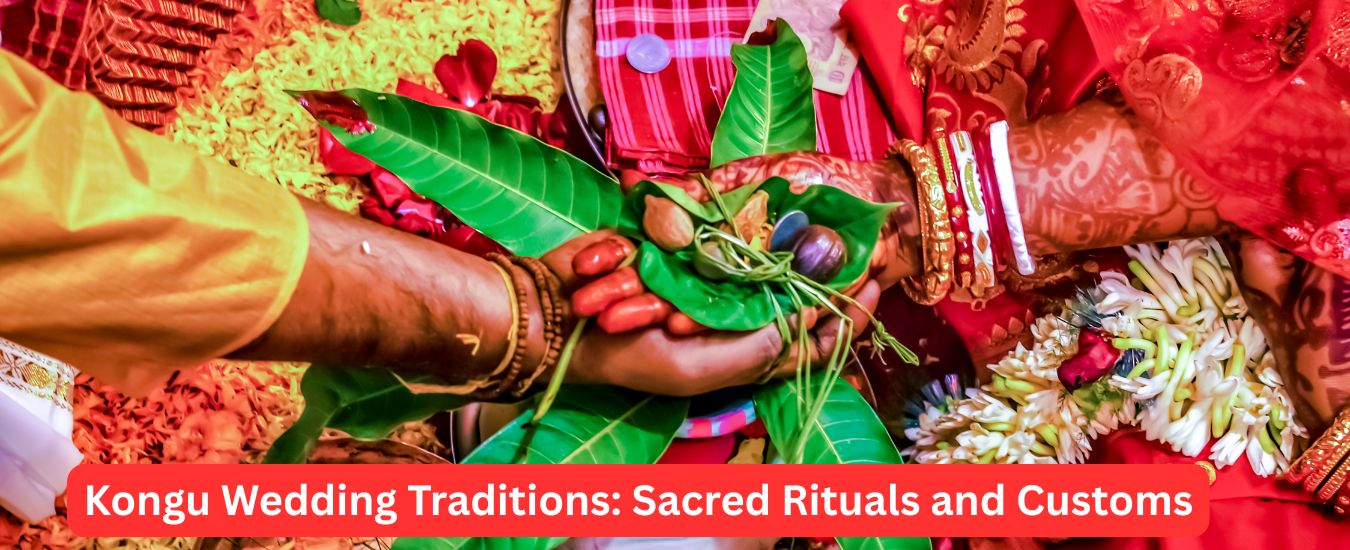Indian weddings are a vibrant fusion of ethnographic traditions, chaos, and celebration. Among them, Kongu Marriage —rooted in the Kongu Nadu region of Tamil Nadu—stands out for its sacred simplicity and deep symbolism. They celebrate community, culture, and commitment with understated elegance.
Where is Kongu Nadu?
Kongu Nadu, in western Tamil Nadu, includes cities like Coimbatore, Erode, Tirupur, and Salem. This region is known for its agrarian heritage, industrious spirit, and cultural depth. It is home to the Kongu Vellalars, a traditional farming community with rich values.
Who are the Kongu Vellalars?
A Tamil-speaking, land-owning group, Kongu Vellalars are deeply tied to both agriculture and commerce. Their weddings are rich in symbolic rituals, guided by family elders rather than priests—making them highly personal and community-led.
Why is Kongu Marriage Unique?
Kongu weddings reflect:
- A priest-less, non-Brahmin ceremonial structure
- Kuladeivam (family deity) worship over temple formalities
- Emphasis on ancestral blessing
- Involvement of community and extended kin
Even the simplest ritual is packed with emotion and cultural meaning.
Kongu Marriage Rituals
1. Jathagam Parthal – Horoscope Matching
The journey begins with Jathagam Parthal, the matching of horoscopes. Families consult astrologers to ensure spiritual and emotional compatibility between the couple.
2. Nichayathartham – The Engagement Ceremony
A formal announcement of the union. Families exchange pattu sarees, gold, and sweets while honouring Kuladeivam and seeking ancestral blessings.
3. Kalyana Parisu – Exchange of Gifts
Both families present gifts—like household items, silverware, and clothing—for the couple’s new life. It’s both symbolic and practical.
4. Nalangu – Beauty & Bonding Ritual
In this vibrant ritual, the bride and groom are pampered with turmeric paste, sandalwood, and gingelly oil. Elders apply kolam (traditional rangoli) and sing folk songs.
5. Mappillai Azhaippu – Welcoming the Groom’s Party
With melam (traditional drums), garlands, and aarthi, the bride’s family welcomes the groom like royalty.
6. Kasi Yatra – Spiritual Comedy
The groom enacts leaving for Kasi (Varanasi) as a sanyasi. The bride’s father interrupts with a marriage proposal, adding fun to tradition.
7. Oonjal – Swing Ceremony
The couple sits on a ceremonial swing, fed milk and bananas by elders. It signifies marital balance, teamwork, and harmony.
8. Mangalyadharanam – Tying the Thaali
This sacred moment involves tying the customized Kongu thaali, blessed in the ancestral temple, around the bride’s neck with wedding turmeric on her forehead.
Special Wedding Symbols
- Garland Exchange symbolizes mutual acceptance
- Pasupathi (Temple Cow) is paraded as a symbol of purity and fertility
- The use of veshti and Indo-western silk blouses shows tradition-meets-modern
- No Kanyadaanam, reflecting a unique regional belief in shared responsibility over bride-giving
Role of Elders
Elders, not priests, perform key rites—reflecting familial authority and collective blessing. Their presence reinforces the social and emotional depth of the ceremony.
9. Sammandhi Mariyadhai – Respecting In-Laws
Both families reaffirm bonds with second-gift exchanges, symbolizing shared joy and respect.
10. Reception – Modern Celebration
Expect lavish buffets, LED-lit floral décor, and cinematic photographers capturing every moment. Many couples even livestream the day with custom hashtags.
11. Maru Veedu – Bride’s Return
After a few days at her in-laws’, the bride visits her maternal home. She’s showered with love, millet-based sweets, and gold jewellery.
Unique Cultural Elements
- Bullock cart or harvest-themed décor reflects kongu’s rural identity
- Food served on banana leaves, featuring millet dishes, signifies health and prosperity
- Kongu Nadu folk songs and dances enhance the festive vibe
Why Kongu Weddings Stand Out?
- Rooted in ancestral traditions and community unity
- No priests, no frills—but full of emotion, symbolism, and authenticity
- An ideal fusion of modern elegance and ancient customs
If you ever get invited to one, don’t miss it. You’ll come back with a full heart (and a full plate!).
FAQs
What is the meaning of “Kongu Vellalar”?
“Kongu Vellalar” refers to a prominent agrarian community from the Kongu Nadu region of Tamil Nadu, known for its rich traditions and deep-rooted values.
Are Brahmin priests necessary for Kongu weddings?
Nope! Kongu weddings are usually conducted by family elders, without Brahmin priests, making the rituals more personal and community-centred.
How long does a Kongu wedding ceremony usually last?
Typically, it spans 2–3 days, including pre-wedding, wedding, and post-wedding events. However, some modern couples condense it into a single day.
What is the role of the community in these weddings?
The entire community often pitches in—from cooking to decorating to managing rituals. It’s truly a community-led celebration.
Is the Thaali different from other South Indian weddings?
Yes! The Kongu thaali often carries family-specific symbols and is blessed in ancestral temples, giving it a unique identity and spiritual depth.
